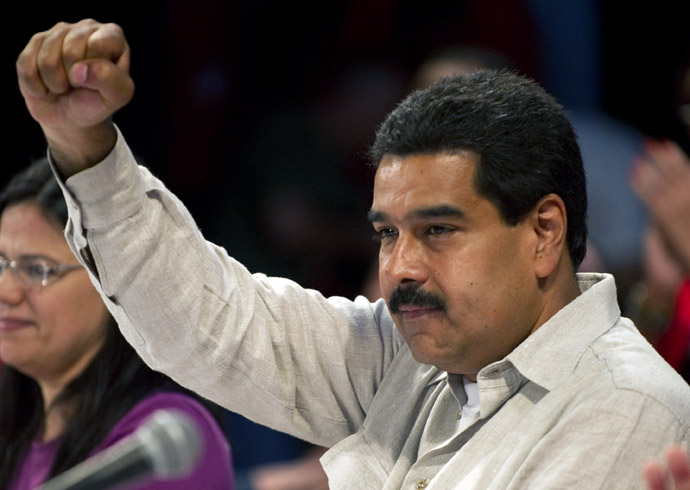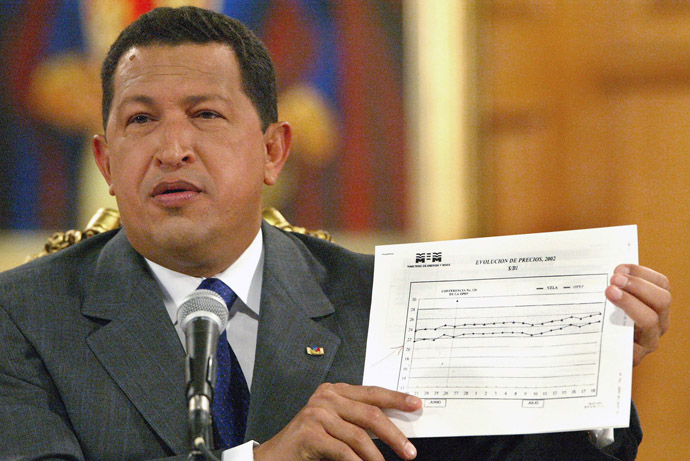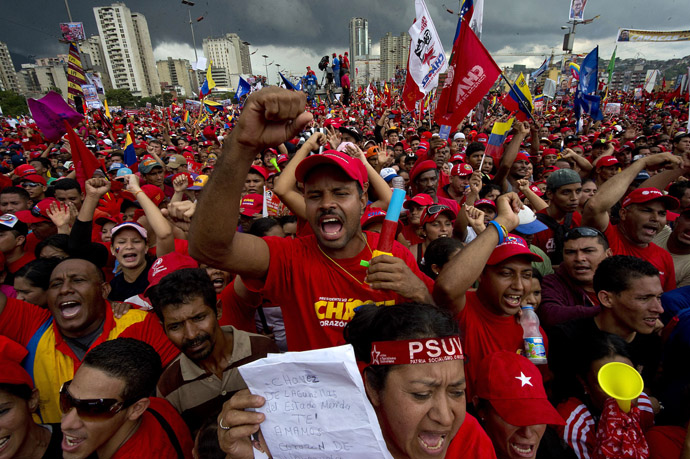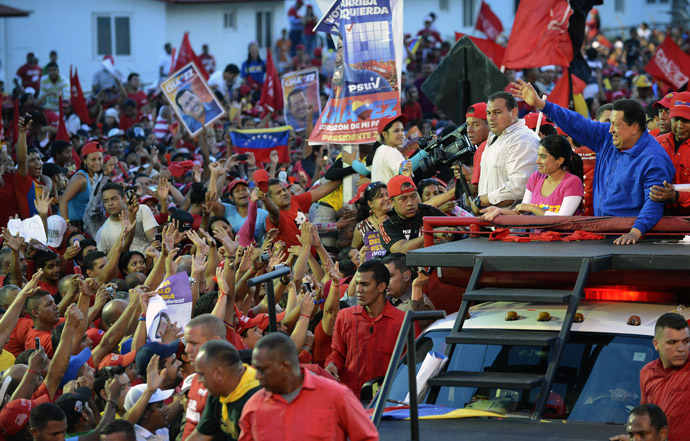On the day that it was announced Venezuela’s President Hugo Chávez had died from an unidentified cancer, two US diplomats were expelled as persona non grata from Caracas for trying to organize some type of coup and conspiracy against Venezuela. Not trying to attract any more negative attention, the Obama Administration would calmly wait until March 9, a day after Chávez’s state funeral, to retaliate by expelling two Venezuelan diplomats.
Executive Vice-President Nicolás Maduro Moros would publicly announce that his government believed that foul play was involved in President Chávez’s death. Maduro alleged that Latin America’s “imperialist” enemies (read the US government) had infected Chávez with some type of pathological agent that caused terminal cancer. This was a sentiment that was echoed by a few world leaders, including Bolivia’s Evo Morales and Iran’s Mahmoud Ahmadinejad that said they too suspected foul play. Maduro also announced that a scientific investigation would be launched to see if Venezuela’s late leader was murdered.
*
*
*
*
*
*
*

While the Venezuelan government’s hypothesis can be brushed off as paranoid fantasy and posturing by its adversaries, it is worth noting that it is now generally accepted that the late Yasser Arafat, who served as the chairman of the Palestinian Liberation Organization (PLO) and head of the Palestinian Authority, was killed through radioactive poisoning from polonium. Assassination by poisoning is not as farfetched as some may think on initial assessment. Poisoning is actually a modus operandi of choice in political assassinations. For example, the Central Intelligence Agency (CIA) tried to murder Cuba’s Fidel Castro with poisoned cigars and would later, through what social psychologists would describe as the CIA’s own “mirror-image perception” of others, accuse Iraq of using the same tactics of assassination.
Nor should it be forgotten that President Chávez was the man the US organized a coup against in 2002 in an attempt to secure Venezuela’s oil reserves before the US and UK invaded Iraq in 2003. Chávez was captured at gunpoint and then taken to an airport from which the coup conspirators intended to exile him from Venezuela, but only after he signed a resignation letter that the US had asked them to procure to legalize their illegal takeover of the national government in Caracas. Pedro Francisco Carmona, a wealthy businessman and the head of the Venezuelan Chamber of Commerce, would become interim president. US Ambassador Charles Shapiro would quickly run to meet the coup leaders and even joyously take photographs with them whereas the Venezuelan Supreme Court, the elected members of the National Assembly (Parliament), and Electoral Commission were all dismissed.
The US was involved and aware of every aspect of the coup. The Pentagon had military officers at the base where Chávez was being imprisoned and US military officers had met earlier with the coup leaders. Through access to US federal government documents under the Freedom of Information Act, it was also proven that the CIA was given the coup leader’s conspiracy plans five days before they took action. The coup president Carmona would even escape to the Columbian Embassy as a means of entering the US; he would be taken to Columbia, from where he would enter the US.

Outright lies as a method
Regardless of the political views and interpretations about the late Hugo Chávez, the biased nature of the mainstream media reports about him from places like the US, Britain, and Canada are hard to overlook. The motive has been “Venezuela can look to a better future and freedom now that Chávez is dead.” These statements were deliberately and misleadingly packaged to instill a negative interpretation of the late Venezuelan leader as a dictator. Thus, Venezuela under Chávez is casually portrayed as an undemocratic banana republic that is politically and economically unstable. Never mind the fact that international election monitors concur that Venezuela’s elections since Chávez came into power are impeccably fair, transparent, and free. This narrative systematically overlooks the fact that Chávez’s programs dramatically raised the country’s standards of living and cut poverty in half and ignores the fact that the “Bolivarian marketplaces” brought down the prices of commodities by about 40%. Never mind that healthcare programs and education rates expanded dramatically and became universally free. Almost two million people were taught how to read under Chávez’s administration, while the economy more than doubled in size a few years after the failed US-supported coup of 2002. Facts have never gotten in the way of US foreign policy, whether it is about weapons of mass destruction (WMDs) in Iraq or about the sinking of the USS Maine in Havana.

Reality has not deterred the US from vilifying Caracas through an entire array of outright lies and this has continued even with Chávez dead. His state funeral was depicted as a Chávista festival and there was a noticeable downsizing of the number of the crowds into mere “thousands.” The reporting of numbers would have been different in terms of accuracy if it were the funeral of a leader in the US or UK. The generalizations, ambiguities, and lexical terms in the reporting betray how there is a systematic attempt to construct a negative perception of Hugo Chávez and navigate the interpretive processing of audiences and readers.
Firstly, many of the biased reports emphasized that dictators and strongmen attended the funeral. This creates an association in the minds of audiences and readers that is aimed at generalizing Chávez as a member of an authoritarian club by extending the category of dictator onto him. This is why the event was also portrayed in some reports as a meeting of the “Axis of Evil.” This is usually followed by a case of specificity that refers to the Venezuelan crowds as “Chávez supporters.” Using critical discourse analysis, this can also be linked to over-lexicalization. Over-lexicalization encodes a specific perception through the excessive and repetitious use of specific descriptive words. People who are demonized/otherized or powerless are usually over-lexicalized; for example criminals that are African-American or Hispanic in the US will be called “African-American criminals” and “Hispanic criminals” whereas criminals who are considered white will be simply referred to as just criminals under an over-lexicalizing narrative.
Venezuela’s allies were also referred to as “Chávez’s allies” as a means of personalizing the relationships and alienating Venezuela’s ties with countries like Iran as being unnatural. Aside from Fox News, many of the same media outlets that reported on Chávez’s funeral would never refer to the crowds of Americans that assemble in Capitol Hill for a presidential inauguration as “pro-Obama” or “Obama supporters.” The British citizens who go to Buckingham Palace for a jubilee or some other royal event involving the British monarchy are never referred to as “monarchist” or “royalist” either. In order for pro-Obama crowds and British monarchists to exist there have to be anti-Obama groups and British republicans, but instead the crowds on Capitol Hill and around Buckingham Palace are simply generalized as American and British citizens and people respectively.

Chávez’s opponents claim that Venezuela was not a democracy or a better place under his administration. Aside from this being perversely untrue, such claimants ought to be asked “as opposed to what?” Venezuela largely became a democracy under the presidency of Hugo Chávez and the living standards of the poorest strata were improved. Before Chávez, inflation had risen to 70% and there were major cuts in what little public spending Venezuela’s government made. The last president, which many members of the opposition like, was also caught stealing from the country’s treasury. All this and the country’s poor, however, are not issues for Chávez’s critics inside and outside of Venezuela. These critics either care about the interests of an elite minority in Venezuelan society or about turning Venezuela into an American satrap once again. Ironically, it is even because of the very media freedom laws that Chávez himself introduced to Venezuela that his country’s opposition is able to criticize Chávez, and in many cases outright slander him with Fox News-style infotainment and ad hominem attacks through its media networks, which includes the infamous Radio Caracas Televisión (RCTV) that supported the 2002 coup. Aside from the state-run media that has an audience that amounts to no more than 10% of the country’s domestic audiences, it should also be noted that the opposition owns 80% or more of the mainstream media in Venezuela.
Cult of Personality versus Passing the Torch
Because Señor Chávez has passed away, the world will be able to see if the Bolivarian Revolution was held together by a cult of personality based around his persona or not. The viability of Chávez’s political project will be tested in Venezuela’s post-Chávez era. Since 2011, the leadership of the United States has eagerly been monitoring Hugo Chávez’s health, just like it has eagerly watched the aging Castros on the island of Cuba. The vibes being given off by the leadership in Washington, DC is that it believes that the late Chávez was the force holding the United Socialist Party of Venezuela together.
Nicolás Maduro, now interim president, was selected to carry on the torch of the Bolivarian Revolution, because by all accounts and perceptions he was an extremely loyal lieutenant to Hugo Chávez. In October 2012, this is what pressed the ailing Chávez to select Mudaro as the executive vice-president of his country. Chávez was taking precautions by preparing Maduro to take over his mantle to serve as the leader of Venezuela. Despite being a loyal Chávista, far stronger and politically aggressive candidates, like National Assembly President/Speaker Diosdado Cabello and Petroleum Minister Rafael Ramírez, could have challenged Maduro and jockeyed for the leadership of the United Socialist Party and the office of the Venezuelan President.
In 2012, Chávez won the presidential election by getting 55% of the vote, while his opponent got about 44.3% of the vote. In 2010, the United Socialist Party won 48.3% of the vote, while opposition parties won 47.2% of the vote. Excluding the approximately 4% of the vote that the allies of the United Socialist Party won, the margin of difference in 2010 was 1.1%. Venezuela’s National Assembly would not have been dominated by the United Socialist Party and its allies, and it could have even lost the 2010 elections, if the country’s electoral districts were not gerrymandered before the parliamentary elections.
Political jockeying for power among the United Socialist Party and its allies could have disastrous consequences for the Bolivarian project in Venezuela. The United Socialist Party could revert into the old sectarian party lines or fragment along new ones. It was these divisions among the Venezuelan leftist political parties that Hugo Chávez feared would allow the American-supported opposition to take over his country through presidential and parliamentary elections, which motivated him to create the United Socialist Party in 2007. In fact, the American-supported opposition coalition lost the last presidential and parliamentary elections by relatively small margins.
No sooner had Hugo Chávez died, did members of the Venezuelan opposition start new consultations with their patrons in Washington, DC. Divide and conquer is the objective against the Chávistas. This is the scenario that both the Venezuelan opposition and the US government want to induce. This is one of the reasons that the opposition has been trying to use constitutional grounds to push National Assembly Speaker Diosdado Cabello to assume the interim presidency, hoping it would create a rift between him and Nicolás Maduro that would divide and ultimately weaken the Chávistas.
Under Article 233 of the Venezuelan Constitution it is stated that the president/speaker of the National Assembly is to become the interim president of the country if the individual who has freshly become the president-elect, but who has not been sworn into office by the National Assembly or the country’s Supreme Tribunal of Justice and who is not acting-president, dies. The executive vice-president is to take over as the interim president if the acting-president or president dies. In both scenarios it is constitutionally mandated under Article 233 that a new presidential election must take place within thirty days.
Weeks after assuming the interim presidency, Maduro also revealed that the CIA and Pentagon have hatched a plan to assassinate his opposition rival from the Coalition for Democratic Unity (MUD) who is due to face him on April 14, 2013. The aim of such an assassination is to further polarize the country and to destabilize Venezuela, maybe even start a civil war or to isolate it internationally.
The Future of Twenty-First Century Socialism in Latin America
The Bolivarian Revolution is a social and political movement. It can be labeled as many things, from Chávismo to Twenty-First Century socialism. One of the best ways to describe it is as a much more inclusive form of governing that is based on the practice of the broader democratic participation of the disenfranchised poor and working class in the management of the state.
Despite alienating the middle class, Chávez worked for a united front domestically and internationally. He burst into Venezuela’s political scene with a mixed coalition of leftists of different stripes, career soldiers, and small capital. In the context of class hegemony, this is what Antonio Gramsci would describe as the process of “bloc building” that is a part of a simultaneous continuous war of maneuver and war of position. In the context of hegemony at an international relations level, neo-Gramscians would also use a term like bloc building to describe the alliances that Venezuela and its Latin American allies have formed with countries like Russia and Iran. Along with massive amounts of oil and money, this bloc formation concept is what has led to Venezuela’s success.
The importance of Venezuelan oil to the US economy is critical. There are hopes in Washington, DC that Caracas will take steps for a rapprochement with the US government, either under Nicolás Maduro or an MUD opposition leader like Governor Henrique Capriles Radonski. Capriles is a lawyer, the Governor of Miranda, the MUD’s presidential candidate, and the person that Maduro has accused the US of planning to assassinate to destabilize his country. The message in Reverend Jesse Jackson’s special sermon at Chávez’s state funeral about bridging the gap between the US and Venezuela means much more under these circumstances. Although Jesse Jackson is reported to have attended the funeral as a private US citizen, the Baptist minister and US Democrat is involved in informal diplomacy as a channel between Caracas and the Obama Administration.
.jpg)
Like other MUD politicians, Henrique Capriles has made his position very clear vis-à-vis the US and international relations. He has said on the record that Venezuela should cut or downgrade its relations with Cuba, China, Russia, and Iran. He supports the landowners and he has denounced Chávez’s Bolivarian Revolution as the demagogy of an incompetent socialist leader.
As for Nicolás Maduro, there is also speculation about the path that he will harness Venezuela towards. He has already been looked at suspiciously as a pragmatist. Many Chávistas are not too enthusiastic about him. There has already been speculation that he will work for some type of rapprochement with the United States that may threaten the interests of Venezuela’s Cuban, Chinese, Belarusian, Russian, and Iranian economic partners and allies. If he does re-direct Venezuela’s orbit, he will not be the first political successor of a state that re-orients their country’s position.
Chávez broke Venezuela free from US control and went to Cuba’s aid. The two countries stood alone in Latin America for years until a new generation of regional political leaders emerged in countries like Bolivia and Ecuador. At the same time President Chávez worked hard to help other Latin American countries become economically and politically independent. After Chávez died, Cristin Fernández de Kirchner told the world that it was only Hugo Chávez that had the courage to come to Argentina’s side and help it against the suffocating chain of debt that the IMF and neo-liberalism had immobilized Buenos Aires with.
The founder of the Movement Towards Socialism (an offshoot of the Community Party of Venezuela) and Chávez opponent Teodoro Petkoff said during the earlier years of Hugo Chávez’s presidency that while Venezuela’s government had changed, its society had stayed the same. That had a truth to it before, but it has increasingly become less so with time. The social and educational aspects of the Bolivarian Revolution have challenged the hold of the old elites on a significant portion of the lowest strata of Venezuelan society by allowing the lower classes to form a particular model of political awareness. Although poverty, crime, and corruption still remain in Venezuela, the country has come a long way. Hugo Chávez, the man called el Comandante Presidente by his supporters, has died, but he has left his mark in Latin America’s political landscape and a polarized Venezuela that the US now seeks to exploit in his absence.
Order Directly from Global Research
**NEW**: The Globalization of NATO
Mahdi Darius Nazemroaya
http://www.globalresearch.ca/us-to-keep-vilifying-caracas-even-with-chavez-dead/5329032?print=1


